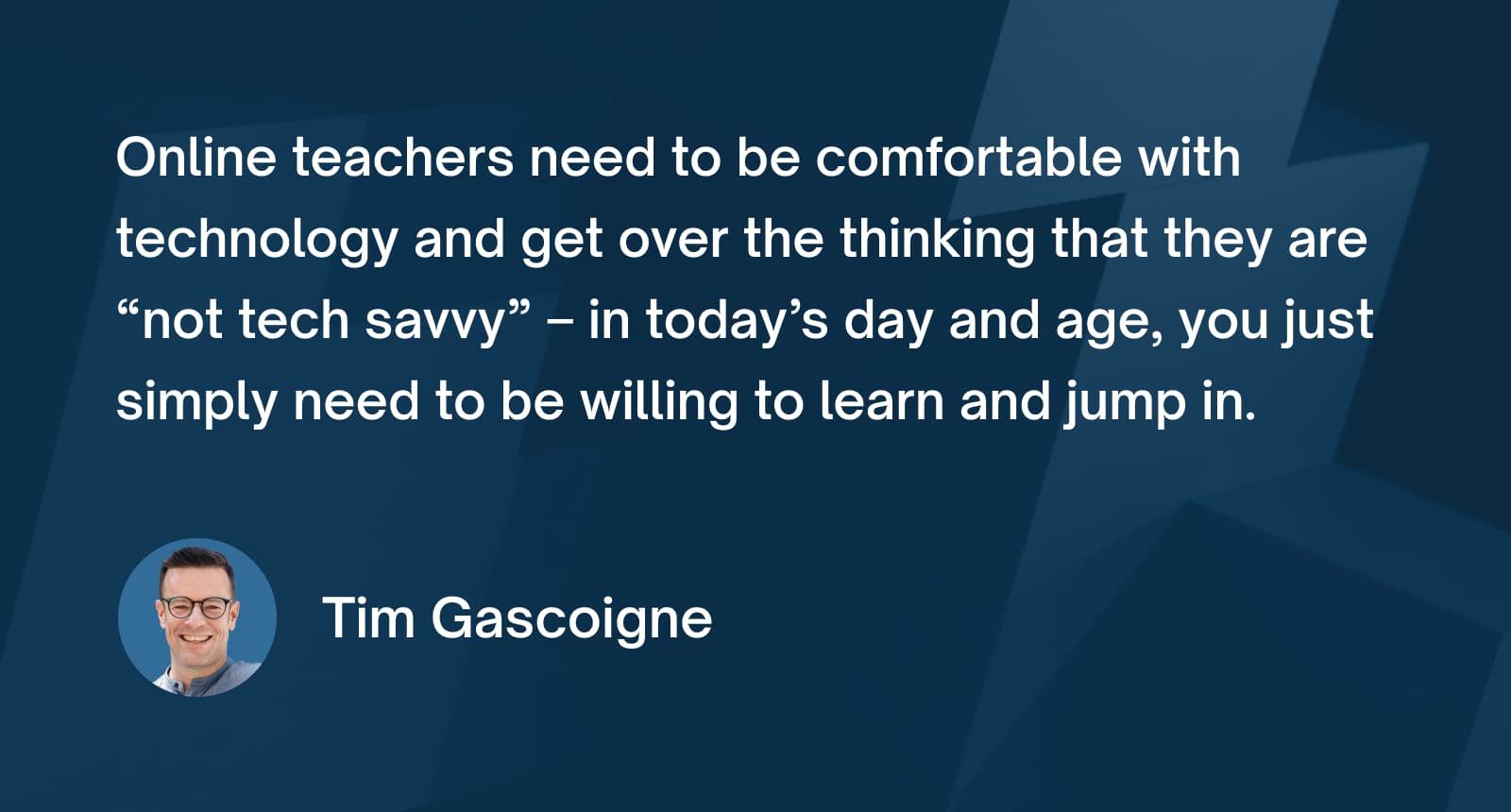OnlineTeacherDude's story: Inspiring Success

In today's fast-paced, technology-driven world, online teaching has emerged as a popular and effective way of learning. It has transformed the traditional classroom experience by providing students with access to high-quality education from the comfort of their own homes. The flexibility and convenience of online teaching enable individuals to work on their terms, create a better work-life balance, and even earn a living while traveling the world. As more and more people realize the potential of online teaching, they are eager to explore this lucrative and fulfilling profession.
Workee experts spoke with Tim, an experienced online teacher and the founder of OnlineTeacherDude. Tim's inspiring journey began in 2017 when he quit his full-time teaching position at an international school overseas. He then transitioned to teaching and working completely online, which allowed him to achieve financial freedom and take control of his life. Today, Tim travels the world while teaching online, and he's passionate about sharing his knowledge and experiences to help others do the same.
Tim's mission is to serve aspiring online teachers and equip them with the tools and confidence they need to leap into the world of online teaching. Through his website, he offers valuable resources and guidance on creating multiple sources of income while teaching online.
Whether you're a seasoned educator or someone new to the profession, Tim's insights and expertise will provide the inspiration and guidance you need to embark on your online teaching journey.
Can you tell us about your journey from being a traditional classroom teacher to an online teacher? What motivated you to make this transition?
Sure, I want to first say that I loved teaching in the classroom. I loved many aspects of it, but there came a time when I knew that I was made for something else and that there were other opportunities out there for me. I saw the opportunities the online world could create, and I decided to take one year off from the classroom initially.
I knew that it was easy to get back into the classroom, so it felt like a safe move. Also, I was living in Malaysia and wanted to spend that year traveling/living around SE Asia, which tends to be a very affordable place to live.
That one year off turned into two, and then now I am completing my 6th year of not teaching and building my own online business!
So, to answer your question, the motivation was initially to take a break and explore other opportunities. Now, my motivation is to make more money than I ever did teaching and to continue to have freedom and flexibility in my life and daily schedule. I absolutely love it!
2. What major challenges did you face while transitioning to online teaching, and how did you overcome them?
Well, online teaching seemed too good to be true when I started. I was able to do everything I loved about teaching, which was working with the kids without all the paperwork, meetings, after-school events, report cards, etc. I could turn on my computer and make money and then turn it off and be finished. That’s a teacher's dream!

I guess a few of the challenges I faced initially included adjusting to a virtual environment instead of a physical classroom environment. I’m pretty tech-savvy, so that didn’t take too long to get used to.
I also really missed my colleagues at school in the beginning, and I felt like online teaching was a bit on the lonely side. I was able to remedy that by getting involved with Facebook groups and forming a community by creating YouTube videos as well.
Other than that, the transition was quite smooth. I had already been teaching a few students online for about 5 years, so I was quite comfortable in that environment.
3. What common misconceptions about online teaching would you like to address?
Sure, there are a few misconceptions that I can address.
I think one misconception is that online teaching is easier than traditional teaching or that it doesn’t require as much work. In reality, it's not easier or more challenging, it just requires a different skill set and strategy compared to the traditional classroom. Teachers need to think about how to engage their students in new ways and how to deliver their lessons so that it’s engaging. Our students have short attention spans, and we need to be effective in our teaching.
Another misconception is that online teaching is less rigorous in terms of academics. This might be more of a misconception of those that aren’t teaching online, and it could arise from perceptions that online learning allows for shortcuts, etc. I think that people are more inclined to lean into online learning since the pandemic, which is a great thing.
Finally, I have heard others say that online teaching lacks personal connection and, therefore, can be very lonely. While, in some situations, this can be true, for the most part, I have been really surprised at the amount of personal connections I can make with other teachers and with my students. I have even met some of them in person in China!
4. Can you share tips and best practices for creating engaging and effective online lessons?
Sure, I’d love to! My approach to creating lessons is to use a pre-made curriculum program as a base and bring in my own resources from time to time, depending on the student's needs. When I initially have my trial class with my student, I evaluate what program/curricula will be the best fit for them.
I take their age, level of English, and focus ability on the camera into consideration when deciding what resources to use. If you are flexible and adaptable, it makes things much easier!
Firstly, try to incorporate some fun ways to learn the material into the lessons. You can easily turn things into a game or a fun activity. These can even be made up on the spot! Let’s say your student needs to learn a grammatical structure, you can bring in some images to your classroom or lessons that show a role-play situation and act it out with your student.

Secondly, use a learning platform that allows you to have multimedia and learning tools. Platforms like Zoom are common for teachers to get started with, but it’s important to understand that Zoom was created for businesses to hold meetings. If you are teaching children, you will want to have a platform that is conducive to learning and creating engagement.
Finally, the best way to create engaging and effective online lessons is to teach to the student and gauge their interest and their needs. You might need to bring in multimedia, videos, or other tools. You might need to use rewards to praise and encourage your students. Or, you might want to consider ways to get your students talking more by using role-play or similar activities. The internet is full of great ideas as well…google is your friend!
5. How important is building a personal brand and online presence for online teachers? What are some strategies you recommend for doing this effectively?
Well, building a personal brand online has been very effective for me and my business. Although I do not have a teaching brand online, my “Online Teacher Dude” brand helps and supports other online ESL teachers.
I do believe that everyone should consider using online spaces to share, add value and build their brand. It can effectively attract students, but it is not an overnight success. Building a brand online can take years, and one needs patience for sure!
Start with the right mindset. By this, I mean do what makes you happy and what is sustainable. If you go into it with the goal of quick fixes and thousands of followers, you will be greatly disappointed. Find one social media outlet and learn all about it. I chose YouTube, but many others are out there, depending on the type of content you like to create. Nowadays, short-form content is doing well, and all platforms offer some variation of making short-form content.
6. How do you keep yourself motivated and continuously develop your teaching skills in the ever-evolving world of online education?
I try not to pay too much attention to trends and things like that. I focus on my students, what I do best to help them, and keep an open mind to new ideas.
There are many ways to level up your teaching - just look in Facebook groups and see what other teachers are talking about but keep focused on your business and don’t get too sidetracked!
7. Based on your experience, what do you think the future holds for online teaching, and how can educators prepare for it?
Well, we’ve all heard and seen the buzz around AI (artificial intelligence) and how this can change our lives in all kinds of fields, both professional and personal. I once heard someone say that AI isn’t going to replace you as a teacher, but teachers who know how to use AI are going to replace you.
I think AI will be a big player in the online learning landscape, both in how students learn and how teachers teach, but I still think our role will remain important and valuable.

I also think that more and more educators are going to emerge as teacherpreneurs and will want to create their own online teaching businesses. I think that ESL companies are going to rely more heavily on AI and pre-recorded classes (because it's cost-effective) which will result in more teachers learning how to have their own online offers for students. So I think this presents exciting opportunities!
8. What platforms or tools do you recommend for online teachers to manage their classes, communicate with students, and create engaging content?
Well, it really depends on where your students are and who you are teaching. You want to make it easy for students to communicate with you. If you are teaching students in China, then you will use WeChat for communication and Xiaohongshu for creating content and marketing. If you teach homeschooled students in North America, you will most likely use Facebook, email, or WhatsApp.
For managing your classes, it also depends. Personally, I use a classroom LMS called Classin for teaching students and scheduling. I use my own organization tool, called Notion, for organising and tracking students, payments, and lessons, and I use WeChat to communicate with my student's parents.
If someone is starting a brand online, choose 1-2 social media platforms you are comfortable with, and don’t get overwhelmed with the options. At the end of the day, it's important that your systems are easy for you to use.
9. For someone considering a career in online teaching, what skills or qualities do you think are essential for success in this field?
Well, for online teaching, I think that one needs to have strong communication skills and the ability to deliver things clearly and concisely.

Also, online teachers need to be adaptable and flexible. Sometimes technology doesn’t always work in our favor, so it’s important for online teachers to think on their feet. There have been a few times that my lessons wouldn’t load, so I needed to have a backup plan and think quickly at the moment.
Online teachers need to be comfortable with technology and get over the thinking that they are “not tech savvy” – in today’s day and age, you simply need to be willing to learn and jump in.
10. Could you tell us more about your website, OnlineTeacherDude.com, and how it can help people start or grow their online teaching business?
Sure, my website is a place to get started as I share the tools and resources that have worked best for me. I help two groups of people: the first being teachers who are brand new and want to find a company or learn how to start teaching independently. The second is online teachers who want to build their own teaching business.
On my website, you can find my free bootcamp course as well as other paid and free resources. I also link my YouTube channel there, which is a great place for online ESL teaching content! Feel free to reach out at any time if you have questions.
Thank you, Tim, for sharing your inspiring success story and supporting Workee!
You can connect with Tim on Facebook and discover more about his work by visiting his YouTube channel.


